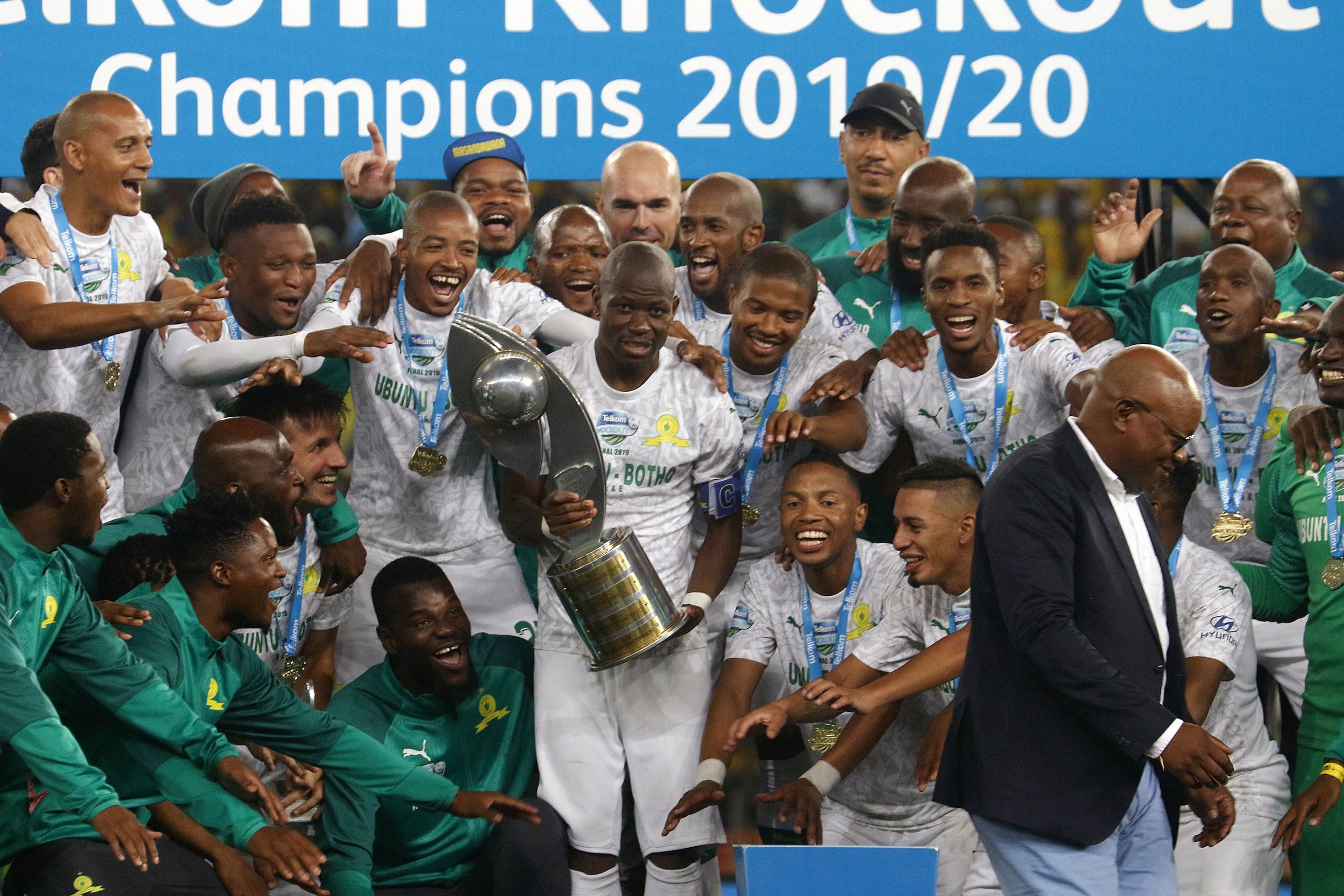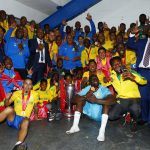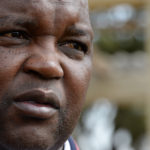What winning has taught Hlompho Kekana
The Mamelodi Sundowns captain lifted his fifth trophy as the club’s skipper when the Brazilians won the Telkom Knockout. Despite his success, he remains a humble figure who is hungry to win more.
Author:
17 December 2019

Hlompho Kekana’s success saved his teeth. And that’s important because he flashes them quite a lot, whether to wear his mischievous grin, don his bright smile or put on his game face as Mamelodi Sundowns’ captain.
Kekana wore that grin when he left Durban’s Moses Mabhida Stadium on 14 December after winning the Telkom Knockout at the expense of Maritzburg United, who they beat 2-1 in the final. The trophy was the ninth that the club has won in the seven years coach Pitso Mosimane has been at the helm. Five of those have come during Kekana’s captaincy, including the 2016 CAF Champions League and 2017 CAF Super Cup, which saw him write his name in bold in the history of the Brazilians as the first skipper to lead the side to continental dominance.
While everyone at the club wore their winners’ medal on Saturday, including Mosimane, who arrived at the post-match press conference with his medal draped around his neck, Kekana wasn’t wearing his. It was tucked safely in his backpack. In fact, he wore it for just a few seconds before taking it off on the podium, where he was handed the trophy. When he lifted the Telkom Knockout trophy, he was the only one on the podium from the match day squad who wasn’t wearing his medal.
Related article:
“The first league medal I won in 2008 [with SuperSport United], I jumped while wearing it because I was celebrating and it hit my teeth. I also got a cut,” Kekana said. “I didn’t want to repeat that mistake again. Every time when we win a cup, I remove my medal and hold it because of that experience.”
Kekana says this with a bright smile that shows his intact teeth. His smile is even more powerful than his feet, which are laced with explosives. It disarms whoever is on the receiving end, such is its warmth. The 34-year-old has the power of making whoever he is talking to at the time feel like the most important person in the world. He is sincere and engaging, and his personality and conduct on and off the pitch make him a perfect captain.
Inspired by a call from his mother
Before he lifted this latest trophy, and before he received his medal or even stood on the podium, Kekana had a moment on his own when everyone at Sundowns was getting ready to celebrate. He paused, soaked it all in and exchanged pleasantries with those congratulating him on the club’s success after their wobbly start.
“It was a bit emotional when I was all alone just before going on the podium to get the cup,” Kekana said. “I spoke to my mom early in the morning [of the final]. She assured me that we are going to win the match if we play like we always play. She said we don’t need to do anything special, we just have to commit to our style of play and play like we normally do. When we conceded, I said, ‘Wow, let it not be the kind of the match where we have to chase and then end up on the losing side.’ I was happy when we equalised, and we eventually got the winner.
“It’s always encouraging to hear from my mom, because she is one person who knows how hard I wanted to be a professional footballer. Support from her always gives me joy and I always want to make her and the family proud. Her words were a morale booster and extra motivation to push myself to the limit.”
Kekana’s professional career started at the Black Leopards. He faced a major challenge on only his second day after signing his first contract. He overslept and missed the bus to training. He walked the more than 10km trip from Makhado to Elim, where Lidoda Duvha were training. That unfortunate event shaped him into the consummate professional that he is today, always among the first to arrive at Chloorkop.
“Every time when I think about that day, it always urges me to do more,” Kekana said. “I feel like I owe myself to do a little bit more. I sometimes overcommit and I over push myself, but I can’t fault myself for that because that’s the person that I am. I should be grateful for the opportunities I have been granted by the club [Sundowns]. Football is my life. Football is what I do best. I love to be on the field of play, which is why I work so hard to enjoy these moments of being a champion.”
Feeding the beast
The Brazilians desperately wanted to be champions again, having gone four years without winning a domestic knockout competition. For all their success, Sundowns have fared poorly when it comes to knockout competitions. Mosimane didn’t mind that much as he says he targets grand slams, and in seven years he has won five of them – four league titles and the Champions League.
But in a country where supporters are fickle and instant gratification is the order of the day, there was an element of uneasiness in terms of how the club had performed in knockout competitions at home. They showed how much they wanted this cup when they thumped AmaZulu 5-0 and then went on to bounce back from a league setback at the hands of Golden Arrows, before returning to Durban to give Abafana Bes’thende their first loss at Sugar Ray Xulu Stadium this season.
Related article:
They completed a hat-trick on KwaZulu-Natal teams by beating the side from the province’s capital in the final. To rub salt into the wound, they did so in KwaZulu-Natal in front of a good crowd at Moses Mabhida Stadium.
“We had to do the business,” Kekana said. “We knew at the back of our minds that we haven’t been doing well in these competitions domestically. We had to redeem ourselves and put ourselves in a position where we can be victorious. I am just happy for the younger ones, Pitso [Sphelele Mkhulise], [Keletso] Makgalwa, Nico [Nicholus Lukhubeni] and Harold [Majadibodu] for winning their first trophy. It’s beautiful to be a part of this team that’s always trying hard to at least bring one trophy to the club each season.”
This win will give the club the impetus they need in their Champions League and Absa Premiership campaigns. They have started on a shaky note in their league defence, but are looking good in the group stage of the Champions League. They lead Group C after two rounds. But their juggling act will get complicated as the season progresses. They will spend Christmas in Algeria as they take on USM Alger on 28 December. January will be tougher owing to their catch-up programme in the league.
Balancing family and team
Mosimane has sort of “cheated” the players’ families. He has allowed them at training, the team’s hotel when they are on the road and the club’s matches to spend time with the players, who won’t be around much this festive season. Kekana was at home in June this year for the first time since 2015 because administrative body the Confederation of African Football (CAF) moved the calendar to run from August to May, instead of the January to November schedule that overlapped between two seasons in South Africa.
“It’s a tricky one when you are leading a team like Sundowns where you are forever on the road,” Kekana said. “The little time we have, you have to try and give it to the loved ones, give them time and love, because the sacrifices we make for the good of the club are huge. We will travel to Algeria on the 22nd, when everyone will be with their families having a braai. But it’s for the club, our supporters and our families we support from our football. Football is what we have as footballers, so we have to make sure that we work hard for the opportunities that we have. We can’t complain. This is our job.”
The hours and days Sundowns’ players spend together crisscrossing the continent has fostered strong bonds. It’s why Mosimane is obsessed about ensuring that the dressing room is “quiet” and not toxic, so as to maintain the high standards he has set.
“We don’t want a flashy dressing room. You never hear issues about [Tiyani] Mabunda, Kekana, Thapelo [Morena], Pitso, [Gaston] Sirino, Mosa [Lebusa], [Motjeka] Madisha, Anele [Ngcongca], Denis [Onyango] and [Wayne] Arendse, and those are the people who have been carrying us all these years,” Mosimane said.
“The dressing room is too quiet. And that’s what helps us. Andile Jali came in and he finally got it. We don’t want the dressing room to be too noisy. We must focus on winning cups, not on Instagram or fashion. I don’t like those things. You need to play football, you are football players and their careers are very short. They must make money and change the lives of their families like [Bongani] Zungu, Keagan Dolly and Percy Tau. People talk about old money, you and me don’t have that. We come from humble beginnings.”
Related article:
Kekana is the embodiment of a “quiet” dressing room. The midfielder only occupies the news for good reasons, whether it’s the consistency that has seen him nominated for Footballer of the Season for four seasons in a row (losing out on all four occasions) or winning trophies with Sundowns. Kekana takes his victories and his failures the same, with a smile on his face and determination to do even better next time.
“I always remember the days when I wanted to be a footballer, back in the villages when I was still young,” he said. “I wanted this so badly. I can’t complain about anything happening in my life now that I am living my dream. I just have to play and, so far, I have been fortunate. I have created so many memories in my football career. I have won so many trophies. I am just enjoying every moment of this journey.



